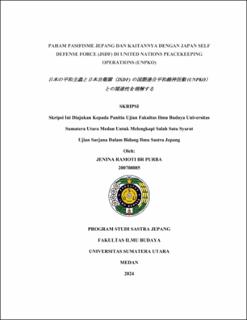Paham Pasifisme Jepang dan Kaitannya dengan Japan Self Defense Force (JSDF) di United Nations Peacekeeping Operations (UNPKO) 日本の平和主義と日本自衛隊(JSDF) の国際連合平和維持活動 (UNPKO) との関連性を理解する
Understanding Japanese Pacifism and Its Connection to the Japan Self-Defense Forces (JSDF) in United Nations Peacekeeping Operations (UNPKO)

Date
2024Author
Purba, Jenina Ramoti Br
Advisor(s)
Arfianty, Rani
Alimansyar
Metadata
Show full item recordAbstract
This study aims to explore the history and role of the Japan Self-Defense Force (JSDF)
in United Nations peacekeeping operations (UNPKO) and its relationship with Japan's
pacifist ideology. The research questions addressed in this study include the historical
development of pacifism within the Japanese government and the concrete role of the
JSDF in UNPKO. This study employs theories of ideology, history, and role theory.
The research method used is qualitative descriptive. The study aims to understand the
historical development of pacifism within the Japanese government and to describe the
concrete role of the JSDF in UNPKO while adhering to its pacifist principles. The
findings show that Japan began to embrace pacifism after its defeat in World War II,
during which the country experienced a traumatic period following the bombings of
Hiroshima and Nagasaki, followed by the American occupation, which led to a
constitutional amendment with the addition of Article 9, embedding pacifism. This
change transformed Japan’s military role from active to pacifist, integrating all its
actions based on pacifist principles (principles of peacefulness), as observed in its
missions in Cambodia and South Sudan through non-aggressive contributions such as
infrastructure and humanitarian aid, consistent with its pacifist principles.
Collections
- Undergraduate Theses [593]
